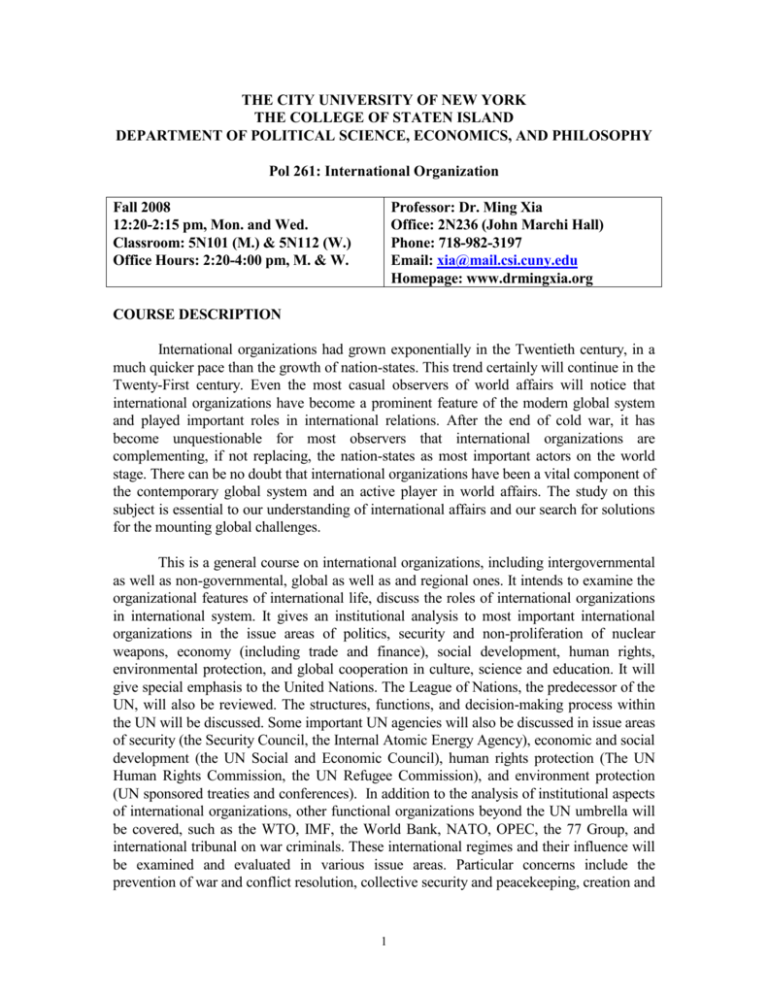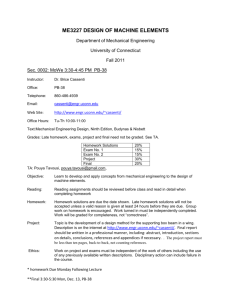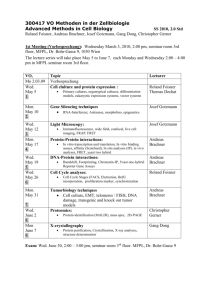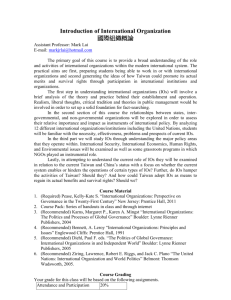
THE CITY UNIVERSITY OF NEW YORK
THE COLLEGE OF STATEN ISLAND
DEPARTMENT OF POLITICAL SCIENCE, ECONOMICS, AND PHILOSOPHY
Pol 261: International Organization
Fall 2008
12:20-2:15 pm, Mon. and Wed.
Classroom: 5N101 (M.) & 5N112 (W.)
Office Hours: 2:20-4:00 pm, M. & W.
Professor: Dr. Ming Xia
Office: 2N236 (John Marchi Hall)
Phone: 718-982-3197
Email: xia@mail.csi.cuny.edu
Homepage: www.drmingxia.org
COURSE DESCRIPTION
International organizations had grown exponentially in the Twentieth century, in a
much quicker pace than the growth of nation-states. This trend certainly will continue in the
Twenty-First century. Even the most casual observers of world affairs will notice that
international organizations have become a prominent feature of the modern global system
and played important roles in international relations. After the end of cold war, it has
become unquestionable for most observers that international organizations are
complementing, if not replacing, the nation-states as most important actors on the world
stage. There can be no doubt that international organizations have been a vital component of
the contemporary global system and an active player in world affairs. The study on this
subject is essential to our understanding of international affairs and our search for solutions
for the mounting global challenges.
This is a general course on international organizations, including intergovernmental
as well as non-governmental, global as well as and regional ones. It intends to examine the
organizational features of international life, discuss the roles of international organizations
in international system. It gives an institutional analysis to most important international
organizations in the issue areas of politics, security and non-proliferation of nuclear
weapons, economy (including trade and finance), social development, human rights,
environmental protection, and global cooperation in culture, science and education. It will
give special emphasis to the United Nations. The League of Nations, the predecessor of the
UN, will also be reviewed. The structures, functions, and decision-making process within
the UN will be discussed. Some important UN agencies will also be discussed in issue areas
of security (the Security Council, the Internal Atomic Energy Agency), economic and social
development (the UN Social and Economic Council), human rights protection (The UN
Human Rights Commission, the UN Refugee Commission), and environment protection
(UN sponsored treaties and conferences). In addition to the analysis of institutional aspects
of international organizations, other functional organizations beyond the UN umbrella will
be covered, such as the WTO, IMF, the World Bank, NATO, OPEC, the 77 Group, and
international tribunal on war criminals. These international regimes and their influence will
be examined and evaluated in various issue areas. Particular concerns include the
prevention of war and conflict resolution, collective security and peacekeeping, creation and
1
maintenance of world economic order, economic development in developing countries,
regional cooperation and integration, protection of human rights, protection of global
environment, and the pursuit of a more just and equal world order.
International non-governmental organizations (INGOs), an important compliment
to the IGOs (international governmental organizations), are also going to be discussed in
the context of global governance. Selected ones are the Amnesty International and Human
Rights Watch (in human right regime), Oxfam and Catholic Churches (in poverty relief
and humanitarian aid) and many others.
Regional organizations in different continent will be discussed to illustrate the
development of regional efforts over cooperation and integration. The EU (European
Union), ASEAN (Association of Southeast Asian Nations), NAFTA (North American
Free Trade Agreement), and APEC (Asia-Pacific Economic Cooperation) will be used to
show the different stages in the process of regional integration.
The main purpose of this course is to provide students a global angle to look at the
challenges confronting the human being and to search for solutions through multilateral
cooperation among the nations, particularly between the North and South (or the West
and the rest). Through a discussion of international organizations and their roles in
various issue areas and the emergence of the global governance, this course will examines
and evaluates the principle of multilateralism in international cooperation, its
manifestation in a variety of regimes, and its future development in consideration of the
challenges and constraints it faces.
REQUIRED TEXTBOOKS
Kelly-Kate S. Pease, International Organizations: Perspectives on Governance in the
Twenty-First Century, 3rd Edition (Upper Saddle River, NJ: Pearson Prentice Hall, 2008).
Karen A. Mingst and Margaret P. Karns, The United Nations in the 21st Century, 3rd
edition (Boulder, CO: Westview Press, 2007).
REFERENCES
Margaret P. Karns and Karen A. Mingst, International Organizations: The Politics and
Processes of Global Governance (Boulder, Colorado: Lynne Rienner, 2004).
Edward Newman, Ramesh Thakur and John Tirman, ed., Multilateralism Under
Challenge? Power, International Order, and Structural Change (Tokyo, New York and
Paris: United Nations University Press, 2006).
Lawrence Ziring, Robert E. Riggs, and Jack C. Plano, The United Nations: International
Organization and World Politics (4th Edition) (Belmont, CA: Thomson Wadsworth,
2005).
2
Thomas L. Friedman, The World Is Flat: A Brief History of the Twenty-first Century
(Updated edition) (New York: Farrar, Straus and Giroux, 2006)
Lisa Martin and Beth A. Simons, International Institutions: An International
Organization Reader (Cambridge, MA: The MIT Press, 2001).
Paul F. Diehl, The Politics of Global Governance: International Organizations in an
Interdependent World (Boulder, Colo.: Lynne Rienner Publishers, 2001)
Stephen D. Krasner, ed., International Regimes (Ithaca, NY: Cornell University Press,
1983).
A. LeRoy Bennett, International Organization (Englewood Cliffs, NJ: Prentice Hall,
1995).
Thomas Weiss, David Forsythe, and Roger Coate, The United Nations and Changing
World Politics (2nd Edition) (Boulder, CO: Westview, 1997).
David Armstrong, Lorna Lloyd, and John Redmond, From Versailles to Maastricht:
International Organizations in the Twentieth Century (New York: St. Martin's Press,
1996)
Lynn H. Miller, Global Order: Values and Power in International Politics (4th Edition)
(Boulder, CO: Westview, 1998)
James P. Muldoon Jr., JoAnn Fagot Aviel, Richard Reitano, and Earl Sullivan, ed.,
Multilateral Diplomacy and the United Nations Today (Boulder, Colo.: Westview, 1999)
Clive Archer, International Organizations (Third Edition) (London and New York:
Routledge, 2001)
Nigel D. White, The United Nations System: Toward International Justice (Boulder and
London: Lynne Rienner, 2002)
Michael Mandelbaum, The Ideas That Conquered the World (New York: Public Affairs,
2002)
A Customized Reader on International Organizations (From the magazine Foreign
Affairs).
The New York Times.
REQUIREMENTS
Two Reports
40%
3
Final Exam
Participation
Attendance
45%
10%
5%
Two Reports: The First Report will focus on “Why Theory Matters? Evaluation of
Various Theories in Explaining International Organizations.” Its due date is Oct. 14, 2008,
Tuesday. The second report is on “Touring UN: Explaining An IO to World Citizens.” Its
due date is Dec. 3, 2008. Two reports must have minimum 6 pages, but not exceed 10.
More detailed writing guide will be distributed in class. Work turning in late will incur a
loss of points.
Considering my lecture will give information not covered by textbooks, attendance
is very important. According to the college attendance policy, which is mandated by the
State Legislature, students who are absent from this course more than six hours (two weeks)
will NOT get graded.
My grading for all these requirements will follow 100-point system. My final score
report will be converted into A-F system. This conversion will roughly follow this formula:
A A- 100-90
B+ B B- 89-80 C+ C 79-70
D+ D 69-60 F below 60
SCHEDULE
Aug. 27, Wed., 2008
Introducing Syllabus
Sept. 3, Wed.
Sept. 8, Mon.
IO: Definition
Classification of International Organizations
Typology for International Organizations
IGOs and INGOs
International and Regional Organizations
Global Governance
Definition
Actors
Significance
Reading: Chapters 1 and 2 in Pease.
Sept. 10, Wed.
Sept. 15, Mon.
Sept. 17, Wed.
Alternative Approaches to International Organization
Theoretical Background: Realism vs. idealism
Critical Approaches: Marxism and Feminism
Constructivism
4
Federalism, Functionalism, Neo-functionalism, Theory of Collective Action, Regime
Theory
Reading: Chapters 3 and 4 in Pease.
Sept. 22, Mon.
Sept. 24, Wed.
Context of the Development of International Organizations
The Liberal Theory
Westphalian System: Rise and Fall
From Nation-states to Interdependence
Post-Cold War Era and New Trends in International Politics
Evolution of International Organizations
Early Proposal for International Organizations
Development Before World War I
Development Since World War I
Development after World War II
The End of Cold and the Expansion of International Organizations
Reading: Chapters 1 and 2 in Mingst and Karns.
Oct. 6, Mon.
Oct. 14, Tue.
(First Essay Due)
The UN System
The Legal Nature of the United Nations
The League of Nations and the United Nations
Collective Security and the League of Nations
The Legal Order of UN System
The UN Values
UN: Structure, Decision-making Process, Role, Reform
Political and Legal Organs
Reading: Chapter 3 in Mingst and Karns.
Oct. 15, Wed.
Oct. 20, Mon.
Oct. 22, Wed.
Peace and Security: Security Regime
International Organizations and International Security
Conflict Resolution
Peacekeeping
Arms Control and Disarmament
Prevention of Nuclear Proliferation: IAEA
Regional Security System
Reading: Chapter 4 in Mingst and Karns; Chapters 5 and 6 in Pease.
5
Oct. 27, Mon.
Oct. 29, Wed.
Nov. 3, Mon.
Global Economy, Market and International Organizations
The Bretton Woods System
GATT and WTO, IMF, the World Bank
Trends in Global Economy
Future of Globalization
Read: Chapter 5 in Mingst and Karns; Chapter 7 in Pease.
Nov. 5, Wed.
Development
NIEO (New International Economic Order) and North-South Relationship
UNCTAD
Reading: Chapter 8 in Pease.
Nov. 10, Mon.
Nov. 12, Wed.
Nov. 17, Mon.
Human Rights Regime: Protecting Human Rights
The Roots of Human Rights Norms
UN, International Criminal Justice and Human Rights
International Organizations and Human Rights
The East vs. the West
Reading: Chapter 6 in Mingst and Karns; Chapter 10 in Pease.
Nov. 19, Wed.
Nov. 24, Mon.
Nov. 26, Wed.
Environmental Protection Regime: The Protection of Environment
International Organizations and Environmental Protection
The Rich vs. the Poor Countries
The Vienna Convention, Montreal Protocol, and the Kyoto Protocol
The Health Issues
The Case of AIDS
Reading: Chapter 7 in Mingst and Karns; Chapter 9 in Pease.
Dec. 1, Mon.
Dec. 3, Wed.
The Future of the UN
Reading: Chapter 8 in Mingst and Karns.
Second Essay Due
Dec. 8, Mon.
Dec. 10, Wed.
6
Web of Global Governance
Evaluating Global Governance
International Organizations, World Order and World Government
Global Governance in the Twenty-First Century
The Future Fate of Multilateralism
Reading: Chapter 11 in Pease.
Dec. 15, Mon.
Review Session
Dec. 17, Wed., 2008
Final Exam
Thank you for taking this course.
I wish you a very happy holiday season!
7









